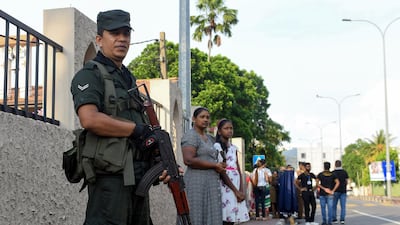Sri Lanka blocked social media and enforced a police curfew on Sunday after some of the worst anti-Muslim violence since terror attacks on April 21 on Easter Sunday that killed more than 250 people.
Several dozen people threw stones at mosques and Muslim-owned stores and a man was beaten in Chilaw, a Christian-majority town on the island's west coast, on Sunday, in a dispute that started on Facebook, Reuters reported.
The author of a Facebook post, identified as Abdul Hameed Mohamed Hasmar, 38, was also arrested on Sunday. His online comment "1 day u will cry" people said was interpreted as threatening violence, Reuters reported.
Authorities also arrested a group of men for attacking Muslim-owned businesses in the nearby Kurunegala district. People in the Buddhist-majority area demanded the men's release, prompting a curfew.
"To control the situation, a police curfew was imposed during the night," military spokesman Sumith Atapattu said.
Sri Lankan authorities said a local militant group, who pledged allegiance to ISIS, were responsible for the bombers who blew themselves up in four hotels and three churches last month.
After the bombings, a social media ban was imposed. Following the anti-Muslim violence, Sri Lankan authorities reimposed the ban, which affected messaging apps including Facebook and WhatsApp.
"Social media blocked again as a temporary measure to maintain peace in the country," Nalaka Kaluwewa, director general of the government information department, told Reuters on Monday.
On Twitter, Sri Lanka's leading mobile phone operator Dialog said it had also received instructions to block the apps Viber, IMO, Snapchat, Instagram and YouTube until further notice.
A violent clash between Muslims and Christians erupted a week ago in Negombo, also known as "Little Rome", where more than 100 people were killed during Easter services. The government also imposed a ban on social media after that clash.
The first public Sunday Mass was held on the same day as the clashes under heavy security. Armed guards protected worshippers while belongings were searched for explosives.

